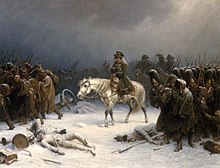The escape song
The flight song is a German folk song . The text was provided by a poem that the Primaner Ernst Ferdinand August (1795–1870) presumably wrote down on paper in 1812 on the occasion of the return of Napoleon's grande army from Russia . Ferdinand August is said to have been a student at the Zum Grau Kloster grammar school in Berlin at the time of its creation .
The poem was given a melody by a hitherto unknown person and quickly spread among the German soldiers who fought against the French troops under Napoleon at the Leipzig Battle of the Nations and the Battle of Waterloo , because the song mocks the enemy. It later found its way into German folk songs and was also sung by non-military people.
After the successful attack on Poland in October 1939, Adolf Hitler quoted the refrain of the folk song:
With man and horse and chariot / So God struck them.
The song is available in different text versions. Sometimes individual words have been exchanged, and the first sentences are sometimes missing. The song was played several times on records , mostly with reference to the Napoleonic wars or as a Landsknechtlied . In 1978 the folk rock band Ougenweide released the song on their album Frÿheit under the title Mit Mann und Roß und Wagen .
The Escape Song (text)
With man and horse and chariot,
God smote them!
It wanders around through snow and forest
The great, mighty French army.
The emperor on the run, soldiers without discipline.
With man and horse and chariot,
God smote them!
Hunter without a gun,
emperor without an army.
Army without an emperor,
wilderness without a sage.
With man and horse and chariot,
God smote them!
Drummers without a drumstick,
cuirassiers in women's skirts,
knights without swords,
riders without horses.
With man and horse and chariot,
God smote them!
Ensign without a flag,
shotguns without a hammer,
rifles without a shot,
infantry without a foot.
With man and horse and chariot,
God smote them!
Generals without a joke,
piece men
'without' guns,
refugees without a shoe ',
nowhere rest and peace'.
With man and horse and chariot,
God struck them like this!
Eater without bread,
every place need,
wagon without wheel,
everything tired and weary.
Women without a car, that's
how God struck them!
literature
- Friedrich Kabermann: From Empire to Nation . Books on Demand, Munich 2012, ISBN 978-3-8423-7504-8 , pp. 227 f . ( limited preview in Google Book search).
Individual evidence
- ^ Gerhard Schulz: The German literature between the French Revolution and the restoration. Second part: 1806–1830 (= History of German Literature. Vol. VII / 2). C. H. Beck, Munich 1989, ISBN 3-406-09399-X , pp. 20 and 886. Cf. also August, Ernst Ferdinand in der Deutschen Biographie .
- ↑ a b Friedrich Kabermann: From the Empire to the Nation . Books on Demand , Munich 2012, ISBN 978-3-8423-7504-8 , pp. 225–227 ( limited preview in Google Book search).
- ^ Gerhard Schulz: The German literature between the French Revolution and the restoration. Second part: The Age of the Napoleonic Wars and the Restoration 1806–1830 . In: DeBoor / Newald: History of German Literature . tape VII / 2 . CH Beck'sche Verlagsbuchhandlung, Munich 1989, ISBN 3-406-09399-X , p. 20 ( limited preview in Google Book search).
